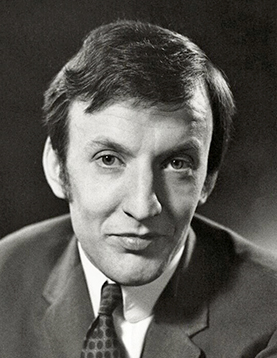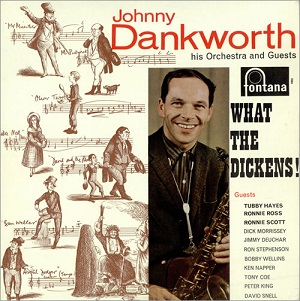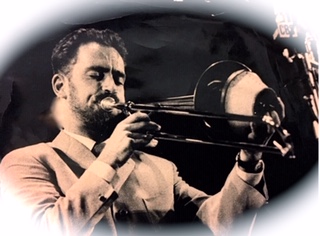Related Research Articles

Kenneth Vincent John Wheeler, OC was a Canadian composer and trumpet and flugelhorn player, based in the U.K. from the 1950s onwards.

Sir Richard Rodney Bennett was an English composer of film, TV and concert music, and also a jazz pianist and occasional vocalist. He was based in New York City from 1979 until his death there in 2012.

Sir John Phillip William Dankworth, CBE, also known as Johnny Dankworth, was an English jazz composer, saxophonist, clarinettist and writer of film scores. With his wife, jazz singer Dame Cleo Laine, he was a music educator and also her music director.
Donald Percy Rendell was an English jazz musician and arranger. Mainly active as a tenor saxophonist, he also played soprano saxophone, flute, and clarinet.

All Night Long is a 1962 British neo noir drama film directed by Basil Dearden and starring Patrick McGoohan, Keith Michell, Betsy Blair, Paul Harris, Marti Stevens, and Richard Attenborough. The story by Nel King and Paul Jarrico is an updated version of William Shakespeare's Othello, set in the London jazz scene of the 1960s. The action takes place in a single evening, during an anniversary party. The black-and-white film features performances by several prominent British jazz musicians—among them John Dankworth and Tubby Hayes—as well as the Americans Dave Brubeck and Charles Mingus, who were in the UK in 1961 when filming took place and were recruited to participate.

Peter John King was an English jazz saxophonist, composer, and clarinettist.

Gerard Presencer is an English jazz trumpeter.
Bernie Glow was an American trumpet player who specialized in jazz and commercial lead trumpet from the 1940s to 1970s.
William A. Le Sage was a British pianist, vibraphonist, arranger, composer and bandleader.
John Burch was an English pianist, composer and bandleader, equally at home playing traditional jazz, bebop, blues, skiffle, boogie-woogie and rock.

Kenny Baker was an English jazz trumpet, cornet and flugelhorn player, and a composer.
Stanley Ernest Sulzmann is an English jazz saxophonist.
Cyril Anthony Kinsey is an English jazz drummer and composer.
Henry Shalofsky, better known as Hank Shaw was an English bebop jazz trumpeter.
Kenneth John Moule was an English jazz pianist, best known as a composer and arranger.
Club Eleven was a nightclub in London's Soho between 1948 and 1950 which played a significant role in the emergence of the bebop jazz movement in Britain.

What the Dickens! is a 1963 recording by Johnny Dankworth, accompanied by his orchestra and guests, some of the leading UK jazz musicians of the day. It is a suite based on characters and scenarios associated with Charles Dickens. It was recorded in London on 29 and 31 July, 7 August and 4 October 1963, and released as a vinyl album. What the Dickens! was bundled with Off Duty in a 2012 reissue.

Keith Anthony Caesar Russell, known as Tony Russell, was an English jazz musician and composer, pianist and trombonist. Notably, he worked extensively with Johnny Dankworth and created the score for The Matchgirls, together with writing theme tunes and background music for TV series such as On the Buses and the children's programme The Herbs. He also composed the music for The Herbs' spin-off, The Adventures of Parsley. At the end of his life he turned from the jazz idiom to write a setting of a Mass.
Jazz 625 is a BBC jazz programme featuring performances by British and American musicians, first broadcast between April 1964 and August 1966. It was created by Terry Henebery, a clarinetist recruited in 1963 as one of the new producers for BBC Two.
Gregory Bowen is a Welsh trumpet player. His primary work was done in London before relocating to Berlin, Germany in 1976. Since 1961, Bowen has performed and recorded with jazz, pop artists and entertainers from Europe and North America on records, soundtracks and T.V. broadcasts. Most notable is his lead trumpet work on the James Bond film soundtracks Goldfinger, Thunderball and You Only Live Twice.
References
- ↑ Lucy Harrison. Carnaby Echoes: The hidden music heritage of Carnaby (2013)
- 1 2 3 4 John Chiltern. Who's Who of British Jazz (1977), p. 51
- ↑ 'Leon Calvert discography', British Modern Jazz website
- ↑ John Dankworth and Leon Calvert, National Portrait Gallery, 1953
- ↑ Massey, Howard (2015). The Great British Recording Studios. Lanham, Maryland, US: Rowman & Littlefield. pp. 248–251. ISBN 978-1-4584-2197-5.
- ↑ 'Leon joins Johnny Dankworth', in Thanet Times, 11 July 1961, p. 3
- ↑ Richard Rodney Bennett: Piano Concerto/Jazz Calendar, Philips 6500301 (1961)
- ↑ Tony Kinsey – Thames Suite, Spotlite SPJ504 (1977)
- ↑ Stamford Mercury, 21 August 1987, p. 9
- ↑ 'Jazz trumpeter Leon at Angel', in Dunstable Gazette, 4 November 1992, p. 27
- ↑ Leon Calvert biography, IMDb